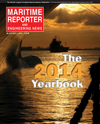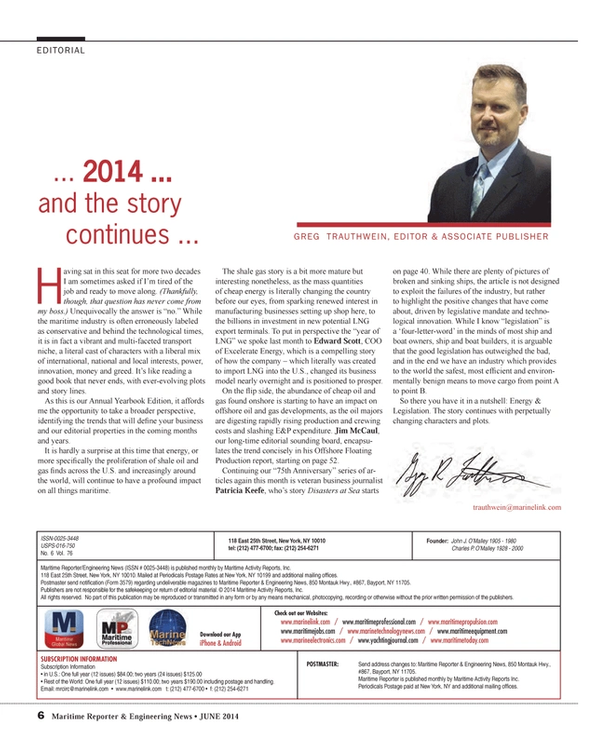
2014 . . . And the Story Continues
Having sat in this seat for more two decades I am sometimes asked if I’m tired of the job and ready to move along. (Thankfully, though, that question has never come from my boss.) Unequivocally the answer is “no.” While the maritime industry is often erroneously labeled as conservative and behind the technological times, it is in fact a vibrant and multi-faceted transport niche, a literal cast of characters with a liberal mix of international, national and local interests, power, innovation, money and greed. It’s like reading a good book that never ends, with ever-evolving plots and story lines.
As this is our Annual Yearbook Edition, it affords me the opportunity to take a broader perspective, identifying the trends that will define your business and our editorial properties in the coming months and years.
It is hardly a surprise at this time that energy, or more specifically the proliferation of shale oil and gas finds across the U.S. and increasingly around the world, will continue to have a profound impact on all things maritime.
The shale gas story is a bit more mature but interesting nonetheless, as the mass quantities of cheap energy is literally changing the country before our eyes, from sparking renewed interest in manufacturing businesses setting up shop here, to the billions in investment in new potential LNG export terminals. To put in perspective the “year of LNG” we spoke last month to Edward Scott, COO of Excelerate Energy, which is a compelling story of how the company – which literally was created to import LNG into the U.S., changed its business model nearly overnight and is positioned to prosper.
On the flip side, the abundance of cheap oil and gas found onshore is starting to have an impact on offshore oil and gas developments, as the oil majors are digesting rapidly rising production and crewing costs and slashing E&P expenditure. Jim McCaul, our long-time editorial sounding board, encapsulates the trend concisely in his Offshore Floating Production report, starting on page 52.
Continuing our “75th Anniversary” series of articles again this month is veteran business journalist Patricia Keefe, who’s story Disasters at Sea starts on page 40. While there are plenty of pictures of broken and sinking ships, the article is not designed to exploit the failures of the industry, but rather to highlight the positive changes that have come about, driven by legislative mandate and technological innovation. While I know “legislation” is a ‘four-letter-word’ in the minds of most ship and boat owners, ship and boat builders, it is arguable that the good legislation has outweighed the bad, and in the end we have an industry which provides to the world the safest, most efficient and environmentally benign means to move cargo from point A to point B.
So there you have it in a nutshell: Energy & Legislation. The story continues with perpetually changing characters and plots.
(As published in the June 2014 edition of Maritime Reporter & Engineering News - http://magazines.marinelink.com/Magazines/MaritimeReporter)
Read 2014 . . . And the Story Continues in Pdf, Flash or Html5 edition of June 2014 Maritime Reporter
Other stories from June 2014 issue
Content
- 2014 . . . And the Story Continues page: 6
- No Middle Ground for Environmental Lobby page: 8
- Simplifying Float-over: Versatile Ballast System page: 10
- Offshore Float-over Installation Generates Renewed Interest page: 10
- W. Palm T-Ball Flies “Maritime Reporter” Flag page: 12
- MERS-equipped Ship Records 8% Fuel Savings page: 14
- Metalcraft Marine Delivers for the Port of Houston page: 14
- Jaenichen Weighs in on Title XI page: 16
- Free Software for Speed/Power Analysis page: 18
- Ship Maintenance Goes High Tech page: 20
- The U.S. Maritime Bunker Market: Opportunities Abound page: 22
- Maritime Communication: A Bold New Shape and Direction page: 24
- Internet at Sea: Staying Connected page: 26
- US Navy Build Programs Face Budget Pressure page: 28
- Excelerate Energy & the Year of LNG page: 34
- Disasters at Sea & Their Impact on Shipping Regulation page: 40
- Titanic & the Launch of a Landmark Safety Agreement page: 45
- Marine Salvage Saves Time, Money, Lives & the Environment page: 50
- Offshore Floating Production Market Update page: 52
- Training to Prevent Marine Accidents & Deaths page: 62
- Kongsberg Delivers Unique Rig Training Model page: 64
- New LNG Bunkering Safety Training Course page: 65
- WW II Liberty Ship Leak-free after 70 Years page: 68
- New Class of PFDs Target Improved Safety page: 70
- Stauff Sensors Offer Real-time Oil Monitoring page: 71
- AWT Launches Voyage Calculator page: 71
- First Pieces of Scrubber System Fitted on AIDAluna page: 71
- Applied Membranes’ Line of Watermakers page: 71
- Laborde Repower Provides Long Tug Endurance page: 71
- John Deere Engines for Marine Auxiliaries page: 71
- New Steering System from Rio Controls & Hydraulics page: 71
- Hebe: A New Steering Control System page: 72
- Safe Escape Locking Systems Launched page: 72
- Marco Debuts New Blastmaster Air Dryers page: 72
- New Kissling Battery Disconnect Switches page: 72
- Schmitt & Ongaro Launch New Grab Rail page: 72
- What’s in Your Engine Oil? page: 72
- UT99 AG Oil Mist Separator is GL-Approved page: 73
- Alfa Laval Adds PureBallast 3.0 to Chemical-free Range page: 73
- PPG PMC Awarded for USS Freedom Coating page: 73


